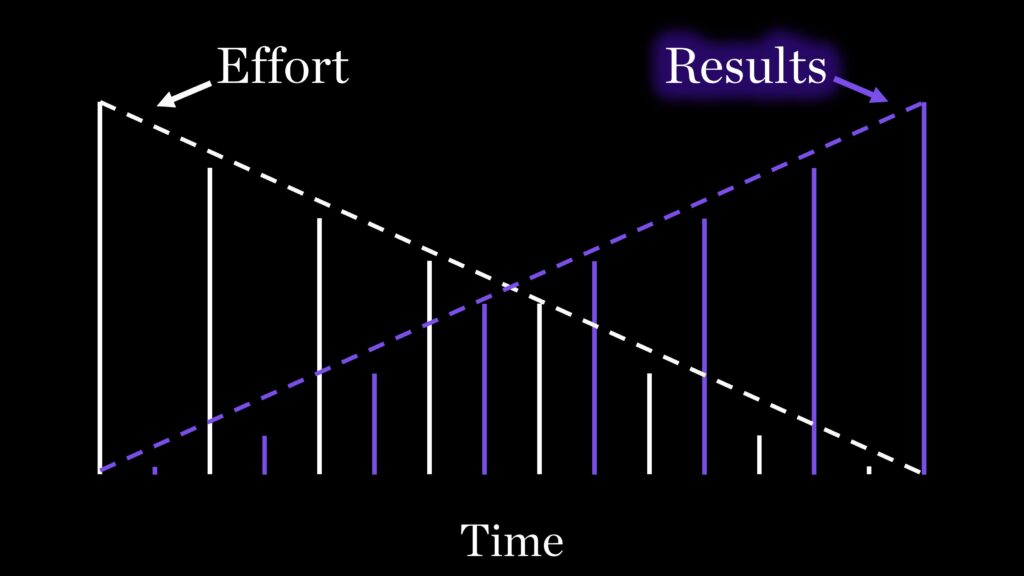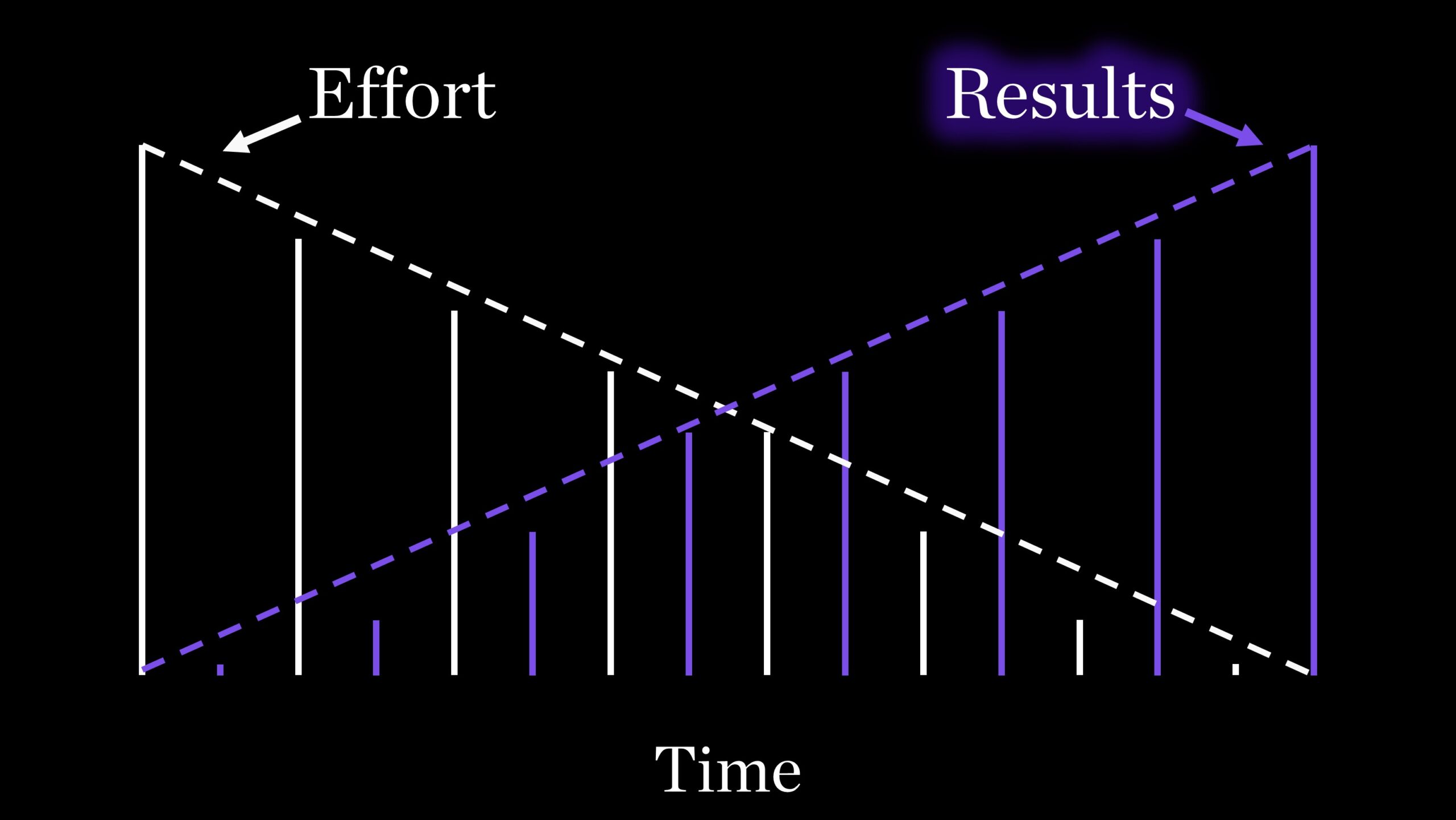Article last updated on January 16, 2022
It’s true that self discipline gets easier with time. But it doesn’t happen overnight.
It takes patience and persistence.
When you try to make a change, it can be difficult at first. You might have a lot of energy and motivation, but after a few days or weeks, you start feeling like you’re not making any progress.
Is this common? What can you do to keep going? Yes, it is common for us to feel discouraged as we try new things that require self-discipline.
In the beginning, many people will take on too much at once and then get frustrated when they don’t see results as quickly as they would have liked. But it doesn’t have to be this way!
I have experienced this many times, but I can tell you that self discipline really gets easier as you are working on it.
Let me share with you how to create a plan for your success so that your self-discipline becomes easier with time.
The Distorted Timeframe and Self Discipline
If you were successful in accomplishing some goals in the past, it probably wasn’t easy. And now that you’ve hit a wall, you may wonder if there’s anything you can do differently.
But this block you have is just a temporary obstacle if you zoom out and be still for a moment.
Whenever you see something not working, think about the lagging results.
Let me illustrate this for you.

This goes for good and bad things.
It simply takes time for results to compound, and this relates to self discipline as well.
As mentioned at the beginning of the article, if you’re still struggling with self-discipline, there are two main reasons:
- Patience
- Persistence
Let’s look at each reason in detail.
Patience
If you want to accomplish more with self-discipline and less struggle, you need to learn to wait patiently.
This means you must be patient with yourself and others.
We all know that waiting is hard work. We all want instant gratification.
All good things come slowly.
So why should we expect our self discipline to be different?
To help you understand, let’s look at an example.
Imagine you want to lose weight. You go to the gym and exercise every day. After one week, you notice that you haven’t lost any weight.
What happens next? Do you stop exercising? Do you give up?
No!
Instead, you continue to exercise and keep putting in the work.
Patience is one of those characteristics that are rare these days. If you work on it, automatically, you’ll be one of the few who have it.
In short, having patience means:
- Having the ability to stay focused on the goal instead of focusing on the process.
- Being able to put aside feelings of frustration and disappointment when you don’t reach your goal right away.
- Having the ability to recognize that you are doing everything possible to achieve your goal.
Persistence
Next, let’s talk about persistence.
Persistence is different from patience because it requires action.
When you are persistent, you keep trying even after you fail or experience setbacks.
To put it bluntly, you are stubborn when you persist.
Here’s an example of persistence.
Let’s say you want to start a business.
You start writing articles, joining online communities where your target market is located, building relationships with people who could potentially become customers, etc.
Do you stop interacting in these communities and writing articles if a couple of people say something negative to you? No!
Why? Because you believe that you will eventually succeed.
And by being persistent, you get closer to your goal.
Creating a Plan for Success
If you’ve been struggling to make a change, it might be because you’re not following a successful plan.
Creating a success plan is one of the most important aspects of self-discipline and will make all the difference in how well your goals are achieved.
If you don’t have a plan for success, then what should you do? You need to create an actionable plan that is realistic and attainable.
This might be planning out your day or week ahead, making short-term goals that are easy to complete, and setting yourself up for long-term success.
For example, if you want to lose weight, you can set up a plan that includes eating healthier foods, working out regularly, drinking water, getting enough sleep, and taking breaks throughout the day.
Your plan needs to include small steps that lead to bigger results.
The key here is to find a balance between short-term and long-term goals.
Short-term goals are great because they allow you to focus on the immediate task at hand.
Long-term goals are great too, because they provide motivation and inspiration.
Using Self-Discipline to Keep Your Plan Going
What are the main things you hope to accomplish with this new change?
Once you have that goal in mind, break it down into smaller steps.
These steps should be small enough that they are achievable, but still large enough that they will make a difference over time.
Then, create a plan for how you will achieve these goals.
You can use tools like Google Calendar to create recurring reminders so your self-discipline becomes easier with time!
Find out what works best for you and make sure your plan is written down somewhere—even if it’s just on a notepad by your bedside table—so that it’s visible and tangible.
This is how self discipline becomes easier with time.
There’s no magic, just momentum.
Things That Destroy Self Discipline Overtime
Of course, bad habits will destroy your growth. But there are other factors that also cause self-discipline to deteriorate overtime.
In fact, some are so sneaky that we lie to ourselves that it’s OK to do them.
- Junk foods – Unhealthy foods will slow you down. Don’t believe me? Just observe what happens to your energy levels after an hour of eating junk food. This will affect other areas of your life, plus it will give you unnecessary food cravings.
- Lack of exercise – If you haven’t exercised in awhile, do it and see what happens to your willpower and motivation. You will be a different person.
- Negative thinking – Most of the time this is a problem with mental toughness, even though people don’t want to accept that because it is easier to blame external situations.
- Lack of sleep – Not having enough sleep will leave us feeling sluggish and less productive. REM sleep is very important. Prioritize your health over everything else. Who cares if you are a self disciplined but sleep deprived person. You’ll have a lack of willpower and slowly lose your self discipline.
- Lack of structure – Lack of structure means you won’t get anything done. You need to set aside time for yourself every day. No excuses. If you don’t have structure, you create a lack of motivation, and you need that.
- Lack of direction – When you don’t know where you’re going, you’ll never get anywhere. You need to find something that motivates you and keeps you moving forward.
- Lack of focus on larger goal – Your goals should be bigger than just getting through the week. Make sure they are long term.
Whenever you are in doubt about whether or not you can achieve something, ask yourself how much you want it and how long it will realistically take to see the results.
Whenever you are tempted by any sort of temptation, ask yourself: “How badly do I want this?” If the answer is “not at all,” then go ahead and indulge!
From time to time, take 1-2 weeks off and reflect on your compelling goal.
Reflecting on your goal helps you stay focused and motivated, and it also helps you develop self-discipline over time.
You must make a commitment to yourself. If you don’t follow through, there’s no point in making the effort.
Conclusion
When you commit to something, you have to be prepared to stick to it.
Committing to something makes you feel good in the long term.
You want to build a momentum of self discipline.
The more you practice self discipline, the better you become at it.
Just remember that it takes time to develop self discipline and when you are on a roll, keep rolling.


